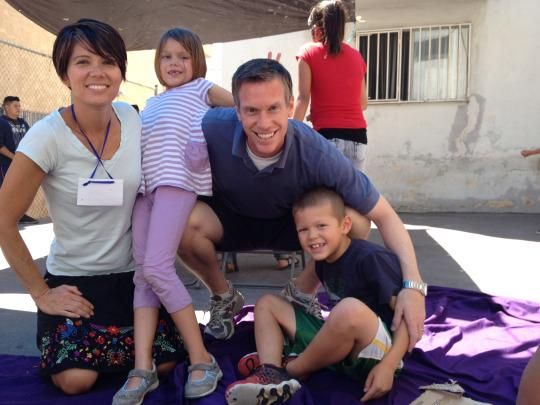When parents and former missionaries Scott and Gabby Dannemiller found themselves getting caught up in what Scott calls “the American hamster wheel of more is better,” they decided to take a drastic measure: no more unnecessary purchases for a year.
In an effort to get back in touch with what they call their family mission, which includes “growing in faith together and serving others to create a world without need,” the Dannemillers decided to stop spending money on things like toys, books, clothing, or anything that wasn’t a necessity (like food, or repairing the refrigerator when it broke) or an experience (like family tickets to a hockey game). They documented the experiment in a book, The Year Without a Purchase: One Family’s Quest To Stop Shopping and Start Connecting, which came out last month.
STORY: Parents Give Away $100K to Deserving Family to Honor Daughter
“This was about focusing less on ‘stuff’ and instead getting connected with each other,” Scott tells Yahoo Parenting. “The thing to remember is that in the grand scheme of things, this was not a big deal – a lot of the world lives on $10 a day, and for families all over the country, this is their everyday, not a fun experiment. There are families that can’t afford food. But for us, the question was, when you do have resources you can spend, where are you going to spend them?”
Overall, Scott says the family successfully stuck to the plan. “There were four times when we fell off the wagon,” he says. They bought their son, then 7 years old, a protective cup to play catcher on his baseball team, and they purchased a pair of shoes, a new vacuum cleaner, and a set of fins they had previously promised their daughter, then 5, if she passed her swim test. But, Scott says, the year had its intended effects. “By focusing on experiences instead of purchases, we grew together in faith as a family, we were able to serve others, we were able to give more of our time and treasure to people who really need it,” he says. “Plus, the kids didn’t even notice.”
STORY: Does Your Child Have Too Many Toys?
Though the experiment took place in 2013, Scott says the family, which lives in Franklin, Tennessee, still tries to live by the lessons they learned while cutting out extraneous spending. “My daughter’s birthday is next month, and she asked if we could go visit her uncle’s farm and ride a horse, rather than just asking for a horse stuffed animal,” he says. “Now we look at purchases and say ‘will that really add value to our life, or is it something we will just need to find space for and take care of?’”
For parents considering a similar experiment, Scott says the first thing to do is be clear on your intent. “For us it was reconnecting, but for others it might be saving money or putting more resources toward things that are important to you,” he says. “The intent is more important than the outcome, so if you slip up, don’t freak out.”
If you’re trying to teach your children to focus less on physical stuff, Scott says it’s helpful to tweak your language when kids ask for things. “We used to say ‘that’s too expensive,’ but that made our kids thing ‘ok, we need more money, and when we get more money we can have it,’” he says. “We shifted to ‘we don’t need that,’ and that helped them understand.”
When cutting down spending, Scott says the most important thing is to focus not on what your family is giving up, but what it is gaining. “It’s not about what you’re losing,” he says. “The question should be, ‘What are we going to replace that with?’ Then, make sure you are adding something to your life that the people in your family value. For us, that was time together.”
Fuente: www.yahoo.com
